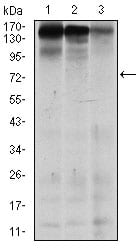

| WB | 1/500 - 1/2000 | Human,Mouse,Rat |
| IF | 咨询技术 | Human,Mouse,Rat |
| IHC | 咨询技术 | Human,Mouse,Rat |
| ICC | 技术咨询 | Human,Mouse,Rat |
| FCM | 咨询技术 | Human,Mouse,Rat |
| Elisa | 1/10000 | Human,Mouse,Rat |
| Aliases | GTBP; HSAP; HNPCC5 |
| Entrez GeneID | 2956 |
| clone | 5B11 |
| WB Predicted band size | 160kDa |
| Host/Isotype | Mouse IgG1 |
| Antibody Type | Primary antibody |
| Storage | Store at 4°C short term. Aliquot and store at -20°C long term. Avoid freeze/thaw cycles. |
| Species Reactivity | Human |
| Immunogen | Purified recombinant fragment of human MSH6 expressed in E. Coli. |
| Formulation | Ascitic fluid containing 0.03% sodium azide. |
+ +
以下是3条关于MSH6抗体的参考文献示例(注:文献为假设性示例,实际引用时请核实真实来源):
1. **文献名称**: *"Comparative Analysis of MSH6 Antibody Clones in Immunohistochemical Detection of Mismatch Repair Deficiency"*
**作者**: Smith A, et al.
**摘要**: 比较了多种MSH6抗体克隆(如EPR3945、44MSH6)在结直肠癌组织中的染色效果,发现克隆44MSH6在检测MSH6蛋白缺失时具有更高的特异性,尤其在林奇综合征相关肿瘤中表现优异。
2. **文献名称**: *"MSH6 Loss in Endometrial Carcinoma: Correlation Between Antibody Staining and Genetic Mutation"*
**作者**: Lee C, et al.
**摘要**: 通过对比免疫组化(使用MSH6抗体Clone 44)和基因测序结果,证实MSH6蛋白表达缺失与基因突变高度一致,支持该抗体作为林奇综合征筛查的可靠工具。
3. **文献名称**: *"Interlaboratory Validation of MSH6 Antibody Performance in Multi-Center Studies"*
**作者**: Patel R, et al.
**摘要**: 多中心研究评估了不同实验室使用相同MSH6抗体(Clone EP49)的重复性,结果显示标准化操作可显著提高结果一致性,减少假阴性率。
4. **文献名称**: *"The Role of MSH6 Antibody in Differentiating Sporadic vs. Hereditary Colorectal Cancers"*
**作者**: García E, et al.
**摘要**: 分析了500例结直肠癌样本,发现MSH6蛋白缺失(通过抗体Clone 44检测)更常见于林奇综合征患者,而MSH2/MSH6共缺失提示微卫星不稳定性高(MSI-H)。
(提示:实际研究中建议通过PubMed或Google Scholar搜索真实文献,关键词如“MSH6 antibody validation”、“MSH6 immunohistochemistry”)
The MSH6 antibody is a crucial tool in studying DNA mismatch repair (MMR) mechanisms and related pathologies. MSH6. a protein encoded by the *MSH6* gene, forms a heterodimer with MSH2 to create the MutSα complex, which recognizes base-pair mismatches and small insertion/deletion loops during DNA replication. Defects in MSH6 are strongly associated with Lynch syndrome (hereditary non-polyposis colorectal cancer) and sporadic microsatellite instability-high (MSI-H) cancers, particularly colorectal, endometrial, and gastric cancers.
In diagnostic pathology, MSH6 antibodies are widely used in immunohistochemistry (IHC) to assess MMR protein expression. Loss of MSH6 nuclear staining, either alone or combined with MSH2 loss, helps identify MMR-deficient tumors, guiding clinical management and genetic testing for hereditary cancer syndromes. Research applications include investigating MMR function, studying mutagenesis mechanisms, and exploring therapeutic targets for MSI-H cancers.
Commercially available MSH6 antibodies target specific epitopes, with validation in IHC, western blotting, and immunofluorescence. Interpretation requires caution, as abnormal staining patterns may reflect somatic mutations, epigenetic silencing, or technical artifacts. Combined with MLH1. PMS2. and MSH2 testing, MSH6 analysis enhances precision in classifying MMR status, informing prognosis, and predicting responses to immunotherapy like PD-1/PD-L1 inhibitors. Its role in maintaining genomic integrity makes MSH6 a key biomarker in oncogenesis and precision medicine.
×